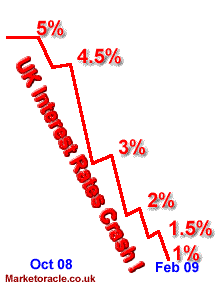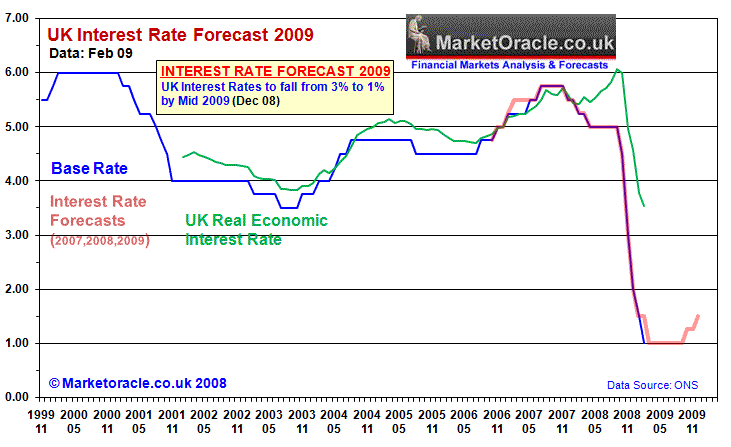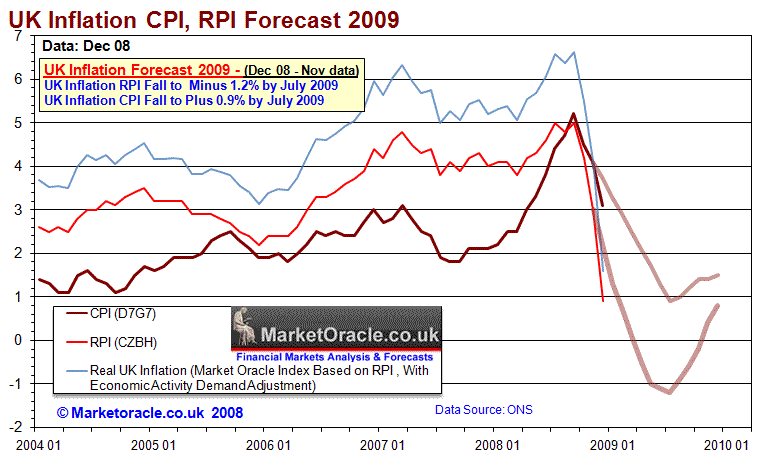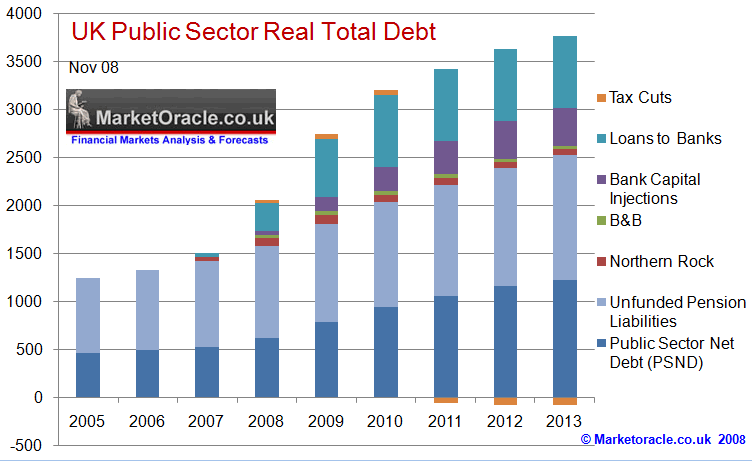UK Interest Rates Crash to 1% New Record Low
Interest-Rates / UK Interest Rates Feb 05, 2009 - 01:32 PM GMTBy: Nadeem_Walayat

 The Bank of England fired the fifth shot in its series of panic interest rate cuts that have taken the base interest down from 5% in October 2008 to 1% today. This follows the crash in UK GDP for the fourth quarter of 2008 which contracted by -1.5% and is inline with earlier analysis that projects towards an additional 3% GDP contraction for 2009.
The Bank of England fired the fifth shot in its series of panic interest rate cuts that have taken the base interest down from 5% in October 2008 to 1% today. This follows the crash in UK GDP for the fourth quarter of 2008 which contracted by -1.5% and is inline with earlier analysis that projects towards an additional 3% GDP contraction for 2009.
 Monetary Policy is failing which is prompting the government to adopt quantative easing "money printing" this can take many forms, but that which has the greatest impact is the Bank of England buying government debt, which has the direct effect of devaluing the currency as the supply of money soars. Printing money has never EVER been the answer, history is littered with the political elite opting to take the short-term quick fix at the direct cost of the long-run. In today's Britain the clear objective is for the Labour Government to work towards the May 2010 election deadline which has prompted policies that are destroying Britain's wealth and future growth which has been reflected in the crash in sterling against all major currencies of more than 30%, for the government cannot hide money printing from the currency markets. Similarly UK debt has been marked lower in the wake of the increased liabilities of the banking system that the Tax payer is guaranteeing.
Monetary Policy is failing which is prompting the government to adopt quantative easing "money printing" this can take many forms, but that which has the greatest impact is the Bank of England buying government debt, which has the direct effect of devaluing the currency as the supply of money soars. Printing money has never EVER been the answer, history is littered with the political elite opting to take the short-term quick fix at the direct cost of the long-run. In today's Britain the clear objective is for the Labour Government to work towards the May 2010 election deadline which has prompted policies that are destroying Britain's wealth and future growth which has been reflected in the crash in sterling against all major currencies of more than 30%, for the government cannot hide money printing from the currency markets. Similarly UK debt has been marked lower in the wake of the increased liabilities of the banking system that the Tax payer is guaranteeing.
Unfortunately the government and the Bank of England are destined to repeat the mistakes of past money printing exercises which is most notably remembered in Germany's Weimar Republic that resulted in hyper inflation which destroyed the wealth of savers and investors. The country at a best case scenario seems destined for many years of stagflation AFTER recession, with the worst case scenario being that the British Isles is just a big version of Iceland with all of the consequences of unserviceable liabilities leading to an economic depression that wipes out as much as 30% of the countries GDP and literally wipe out all of the increasingly illusory debt fueled gains of the 11 years of the Labour government.
UK Interest Rate Forecast 2009
The rate cut to 1% now fulfills the forecast target for 2009 (4th Dec 08 - UK Interest Rates Forecast to Crash to 1% ). ,The next stop would be a similar Zero Interest Rate Policy (ZIRP) as that adopted by the United States that has cut its interest rate to 0.25%.

Whilst the base interest rate stands at 1%, the 3 month libor rate is at 2.14% and the real economic interest rate is at 3.54%, which clearly indicate evidence that the banks are still refusing to the lend and in-effect hoarding government bailout cash injections much of which is being used to reward bonuses to culpable staff.
Inflation to Follow Deflation
My earlier analysis of the UK inflation concluded that the UK is heading for real deflation during 2009, with the RPI inflation measure expected to go negative by mid 2009 by targeting -1.2% . The expectations are for similar deflation across the world, as deficit spending stimulus packages cannot hope to compete against the loss of asset values which are in the order of ten times the amount of planned stimulus. The analysis also concluded in that the immediate risks to the forecast are to the downside i.e. prices spiking lower than expected.

This therefore implies for further stimulus packages far beyond that which have been committed to date, with all of the associated consequences of collapsing currencies under the weight of growing deficits and liabilities which sets the scene for higher future inflation as the deflationary impact of collapse in crude oil during the second half of 2008 starts to leave the inflation indices during the second half of 2009, thereafter the deflationary forces of contracting economies will compete with the inflationary forces of money printing and rising commodity prices.
The current concern amongst investors is the implications of deflation on portfolio allocation for primary asset classes of cash, real estate, stocks, bonds and commodities during 2009 and beyond, with that in mind Robert Prechter has made available for free his in-depth 60 page Deflation Survival Guide e-book.
Bankrupt Bailed Out Banks Rewarding Staff for the Destruction of their Financial Institutions
Bankrupt Zombie banks being kept alive by over £800 billion of tax payer capital injections, loans and guarantees are paying staff that should have been made redundant for gross negligence and incompetence that borders on criminality bonuses that total in the billions. The fallout of what to all intents and purposes amounts to fraud on a monumental scale that has brought Britain itself to the verge of Bankruptcy is playing itself out right across the land as the economy falls off of the edge of cliff as the banks increasingly refuse to lend. There needs to be a wholesale clear out of the UK banking system which means making ALL those who had ANY part in the crisis in their respective institutions redundant, including scrapping all of the board of directors of the banks in which Britain now has a direct capital stake and literally unlimited exposure.
Gordon Brown Bankrupting Britain
Gordon Brown is well on the route towards bankrupting Britain as the liabilities by 2012 will exceed £3.5 trillion from £1.5 trillion at the end of 2007. The prime consideration for the Prime Minister is clearly to win the next election at ANY COST.

The above liabilities do NOT include the £5 trillion of additional liabilities should the government be forced to nationalise virtually the whole banking sector. However, again people need to realise that the future gets discounted in the present, which is why the Bank of England, Treasury and Government policy makers do not comprehend that they cannot embark on the route towards £3.5 trillion plus of liabilities without the market reacting by selling out of the currency long before the country arrives at the debt destination. The effect of this is to make the current crisis far worse as the market seeks to discount the over 80% of the £5 trillion banking sector debt which is denominated in foreign currencies. Therefore the facility to inflate out of debt through "Quantative Easing" does not work, as the repayments have to be made in foreign currencies against which the countries debt burden rises as the currency falls and therefore puts Britain's banks under greater pressure. The impact on the economy is deflationary whilst import prices rise thus suggesting a stagflationary outlook or worse.
On top of ever expanding public liabilities that at the end of 2008 stood at an estimated £2 trillion, there is also the private sector debt of £2 trillion weighing down on the economy and sterling.
Time is running out for the government, forget 2011, 2010, even mid 2009, a currency collapse would bring the debt crisis to a head within a matter of days. Just as occurred with Iceland as it did not take 3 or 4 years for Iceland to collapse into hyper-inflation, it took 3 or 4 days!, as I warned off in the article Iceland Going Bankrupt? , and subsequently warned that all of the conditions that led to the bankruptcy of Iceland are present in the UK.
Sterling's recent fall to below £/$ 1.37 is extremely worrying as it implies the ultimate trend after allowing for the subsequent corrective rally is towards parity to the U.S. Dollar. What does this mean for ordinary people? It means your house prices will not have been DEFLATED by the projected 38% nominal price trend (UK Housing Market Crash and Depression Forecast 2007 to 2012), but rather DEFLATION of 69% on an exchange rate basis, add to that the INFLATION of an increase in import costs across the board, and you have the potential for an Iceland style collapsing economy with hyper inflation that destroys the REAL VALUE of peoples investments and savings.
How Britain Could Prevent Bankruptcy and Currency Collapse
Tax Cuts - Raising the tax free allowance would immediately put cash into peoples pockets, this is far more effective than the 2.5% VAT reduction that has had ZERO impact on the economy following its implementation at the beginning of December 2008.
Public Sector Pensions Liabilities- The government needs to take urgent action to bring the public sector pensions inline with the private sector pensions, which effectively means that the amount of retirement benefits is reduced by 2/3rds as the current growing liability is unsustainable and will mean a huge burden on tax payers that will start to be felt in the near future and is already being factored onto the prospects for the UK economy by foreign investors.
Budget Surpluses by Cutting Public Spending - The public sector is unproductive, it always has been and always will be, for instance for every extra £1 spent on the NHS only results in 10p increase in output. Now that the productive private sector is contracting fast as the once highly profitable financial sector goes bankrupt and increasingly takes many corporations that were barely able to survive along with it in the meantime the unproductive public sector continues to grow and demand ever larger resources which is resulting in the large increase in the budget deficit and hence borrowing, the government needs to be forced to stick to balancing the budget which means severe cuts in public spending and increases in taxes so as to pay down Britain's debt to prevent the country from spiraling into hyperinflation.
The Bankrupt Banking System - The banks are sitting on huge undisclosed losses that run to over £1 trillion. Unfortunately the only answer here seems to be for a step by step systematic nationalisation of the banking system, where each bank is taken over, its debts written off, restructured and quickly re-privatised in a form where retail banks only operate based on the amount actually deposited, i.e. the interbank market can no longer be called upon by any retail banks. The same should apply to other critical financial institutions such as insurance companies. The statements by Mervyn King and Alistair Darling of forcing the banks to lend is naive or foolish or just plain ridiculous, because they cannot lend because they are virtually all BANKRUPT ! And any capital that they do have is being closely guarded in an attempt to survive the Banking Crisis, the last thing the banks want to do is to lend to corporations that may go bust just as we fall off the economic cliff into a deep recession.
Saving Initiatives - To enable the banks to increase the amounts available to lend the government needs to make saving a far more attractive option than it currently is. This could be done by greatly expanding the amount that can be saved tax free which currently stands at £3,600 per annum per person. A more radical approach would be to index savings against a fall in the currency just as bonds and savings certificates are available that are indexed against RPI inflation.
Join the Euro - The last resort for Britain is for monetary union with Europe. The benefit will be that the falling currency problem related to the issue of debt and underwriting of the banking system is diluted as the currency then has far, far more reserves backing it then that for the British Pound alone would be left to suffer a currency collapse. This is effectively what the Irish did when they guaranteed all bank deposits at 100%, for if they had been outside of the Euro then they would have been on the fast track to where Iceland is today as no way could Ireland meet such as liability.
The above measures would be extremely painful but but with a light at the end of the tunnel which is far better than the debt fuelled path to bankruptcy that Britain is now upon where as I have mentioned many times during 2008, what lies at the end of the current path is the Weimar republic that resulted in the total loss of value of the German currency and savings due to hyper inflation.
Rate Cut Winners
The clear winners of economic and financial incompetence are resources that are in limited supply i.e. cannot be printed such as the precious metals, and other commodities, more so as sterling is expected to resume its bear trend following the on going bounce from multi-decade lows against the Dollar and Euro which was correctly called some 2 weeks ago. (21st Jan 09 - British Pound Panic Selling, Counting Down to Bankrupt Britain ). The lows in crude oil and other commodities, in my opinion gives investors a near once in a lifetime opportunity to accumulate at near rock bottom prices!
Many borrowers are seeing their mortgage interest payments evaporate, especially those for whom rates are fixed inline with the base rate or the lucky few that still have rates that are discounted to the base interest rate. However standard variable rates remain significantly above the base interest rate i.e. in excess of 3% with many instances of rates above 4%, therefore most borrowers are not benefiting from the unprecedented rate cuts.
Rate Cut Losers
The clear losers are UK savers where instant access accounts now as the norm pay less than 1%, still there are some accounts that will pay over 3% especially if fixed for a period of time. It seems like another era back in October 2008 when I was warning of imminent deep interest rate cuts and that savers had a short window of opportunity to fix rates of above 7%. However as deflation gives way to inflation we will see UK interest rates start to rise again during the second half of 2009, the only question is will we also see panic interest rate hikes on the way up ? i.e. as the risks of hyperinflation grow as a consequence of Wiemar-esk money printing.
Bottom Line: Deflation is temporary and will give way to much higher inflation. Panic Interest Rate cuts will be eventually followed by Panic Interest Rate Hikes. Take the bounce in sterling to diversify into other currencies, commodities and markets as money printing is extremely bearish for sterling and all currencies in relative terms.
Financial Market Forecasts for 2009
The stocks bear market has reasserted itself in response to bad earnings reports and economic data accompanied by revised IMF forecasts of marked slow down in global economic growth. The stock market trends are in line with the forecast for 2009 that targets new stocks bear market lows for the Dow of 6,600 and FTSE 3,400 as per my earlier newsletter and associated syndicated article of 22nd January.
Gold - Reports that Goldman Sachs sees gold breaking above $1000 within 3 months, though Goldman Sachs also saw crude oil at $200 by the end of 2008 so drawn your own conclusions as to what the master market manipulators are upto, distribution into weak hands? My own take on gold remains as per analysis of 22nd Jan ($850) - Gold is targeting $960 by March to be followed by a downtrend back below $850. Also U.S. Treasury Bonds continuing to trend lower by targeting $120.
- 22 Jan 2009 - U.S. Treasury Bond Market Forecast 2009
- 22 Jan 2009 - Gold Price Forecast 2009
- 21 Jan 2009 - US Dollar Bull Market 2009 Update 4
- 20 Jan 2009 - FTSE 100 Index Stock Market Forecast 2009
- 20 Jan 2009 - Dow Jones Stock Market Forecast 2009
The soon to be published in-depth UK Recession Watch aims to forecast how deep the UK recession will go and implications thereof. To receive this in your email inbox subscribe to my always free newsletter .
By Nadeem Walayat
http://www.marketoracle.co.uk
Copyright © 2005-09 Marketoracle.co.uk (Market Oracle Ltd). All rights reserved.
Nadeem Walayat has over 20 years experience of trading derivatives, portfolio management and analysing the financial markets, including one of few who both anticipated and Beat the 1987 Crash. Nadeem's forward looking analysis specialises on the housing market and interest rates. Nadeem is the Editor of The Market Oracle, a FREE Daily Financial Markets Analysis & Forecasting online publication. We present in-depth analysis from over 250 experienced analysts on a range of views of the probable direction of the financial markets. Thus enabling our readers to arrive at an informed opinion on future market direction. http://www.marketoracle.co.uk
Disclaimer: The above is a matter of opinion provided for general information purposes only and is not intended as investment advice. Information and analysis above are derived from sources and utilising methods believed to be reliable, but we cannot accept responsibility for any trading losses you may incur as a result of this analysis. Individuals should consult with their personal financial advisors before engaging in any trading activities.
Attention Editors and Publishers! - You have permission to republish THIS article. Republished articles must include attribution to the author and links back to the http://www.marketoracle.co.uk . Please send an email to republish@marketoracle.co.uk, to include a link to the published article.
Nadeem Walayat Archive |
© 2005-2022 http://www.MarketOracle.co.uk - The Market Oracle is a FREE Daily Financial Markets Analysis & Forecasting online publication.


